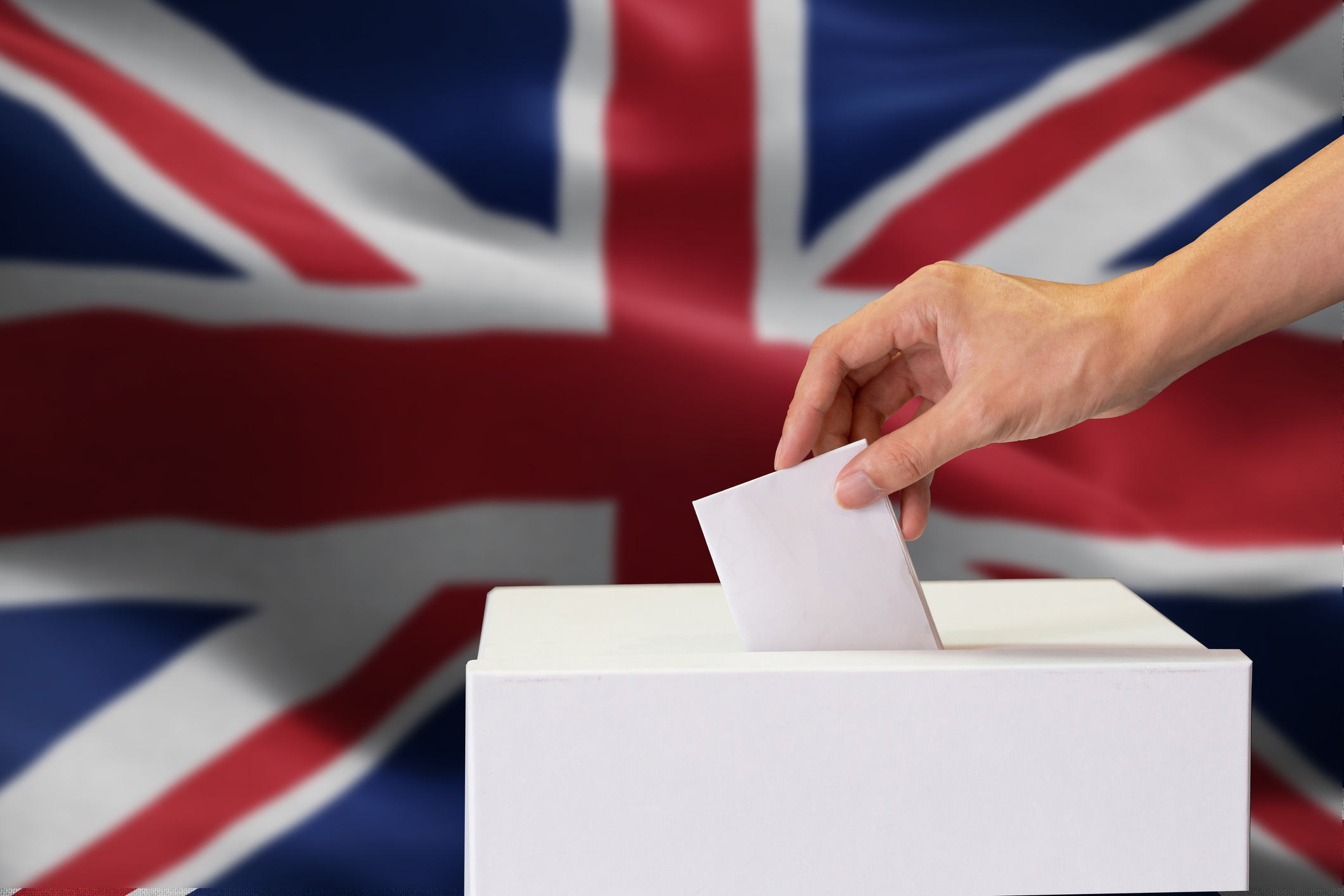The important changes coming to future elections in the UK
Controversial new voting laws threaten to undermine democracy

A free daily email with the biggest news stories of the day – and the best features from TheWeek.com
You are now subscribed
Your newsletter sign-up was successful
Politics professor Toby James of East Anglia University on why more than a million voters are facing disenfranchisement as a result of the Elections Act
Many people across the UK will have their chance to vote in the imminent May elections. But only days before, new laws have been rushed through Parliament, with amendments and approval (Royal Assent) occurring within the space of less than 24 hours. This means that in future, elections will be very different.
The government has pushed through changes which it says will ensure greater protection against election fraud, target voter intimidation at the ballot box and achieve other goals. The new Elections Act will make a number of important changes to how some elections work in the UK.
The Week
Escape your echo chamber. Get the facts behind the news, plus analysis from multiple perspectives.

Sign up for The Week's Free Newsletters
From our morning news briefing to a weekly Good News Newsletter, get the best of The Week delivered directly to your inbox.
From our morning news briefing to a weekly Good News Newsletter, get the best of The Week delivered directly to your inbox.
While citizens need only state their name to vote in May, in future, everyone will be required to present voter ID before they are issued with a ballot paper at UK parliamentary and local elections in England.
This will be familiar to voters in Northern Ireland, where it has long been in place. The primary forms of identification requested in polling stations will be passport and driving licence. Scottish and Welsh local and parliamentary elections will be unaffected.
Many countries have compulsory voter ID requirements – but they also tend to have compulsory national identity cards. Strict voter ID is problematic in the UK because even the government’s own research suggests that 9% of the public do not have up-to-date and recognisable photographic ID.
Those less likely to have the required ID include people with severely limiting disabilities, the unemployed and those without educational qualifications. Trans and gender non-conforming (GNC) people are substantially less likely to have the requisite ID.
A free daily email with the biggest news stories of the day – and the best features from TheWeek.com
Pilots of voter ID at local elections in 2018 and 2019 also found that many citizens were unable to vote because they either lacked the necessary identification – or refused to provide it out of principle.
Those without a form of ID will be able to apply for a free ID card from their local authority, the government says. However, this is more red tape to navigate and my research shows that the more onerous the process, the less likely it is that people will vote.
A reasonable prediction is that 1.1m people will not cast a vote at future parliamentary elections as a result of this reform, unless there is major outreach work. There was scant evidence of voter fraud to justify it. And we need more voters, not fewer.
Election commission independence
There is an international norm that electoral commissions should be established independent from government to oversee the electoral process. This is essential because those in government could be those in breach of the rules. The independent UK Electoral Commission was established in 2000, following party funding scandals and a call to modernise elections.

The Elections Act, however, now gives the government power to set a “strategy and policy statement” for the Electoral Commission. A parliamentary committee, which includes the government’s “election minister”, will then examine whether the commission is giving “due regard” to these instructions. It is already accountable to a part of parliament which is usually cross-party.
The commission will retain independence on specific cases, such as whether an individual party candidate is in breach of the rules. But the strategy and policy statement could steer responses to breaches in general. Or, as the commission itself has warned, the government could direct it to promote voter registration in areas where it has supporters – and worry less about areas where the opposition has greater support.
Disenfranchisement
Who has the right to vote is also changing. The government has abolished the 15-year limitation on eligible British citizens living overseas to be registered to vote in relevant elections in the UK – a win for ex-pats. But with the other hand, it takes away the right to vote and standing of some EU citizens who live and pay taxes in the UK.
There are new complex regulations too. Those EU citizens who were living in the UK before January 2021 and hold lawful immigration status will retain their rights in some elections. Other EU citizens will only have such rights if the UK government negotiates a reciprocal deal with their home country.
This means we’re left with a patchwork quilt of confusing laws. And it is down to the discretion of the government of the day to make deals about who can or cannot vote.
Democracy takes a hit
It is easy to resort to hyperbole, but this is not the end of “free and fair elections”, as has been suggested. But the inclusiveness of elections has been undermined by the act and it weakens the UK’s claim to be a beacon of democracy, which is vitally important in the new cold-war international order.
More worrying has been the approach to making the new rules. A bombardment of reforms have been lumped together including further changes to postal voting and proxy voting, changes to local electoral systems and more. Some laws apply to some elections, others not.
This complexity and the simultaneous passing of other controversial bills (such as the Police, Crime, Sentencing and Courts Act 2022) has created a white noise that has blinded effective parliamentary scrutiny and media coverage. And it comes at a time when there have been calls for to simplify electoral laws.
It has long been the tradition to develop electoral laws on the basis of consensus through a neutral speaker in Parliament, who would preside over a committee following a request from the prime minister of the day.
Key parts of the act were opposed by the human rights and constitutional committees in Parliament, the Electoral Commission, democracy groups, devolved governments and academics. They were also opposed by the Labour opposition and the House of Lords.
Amendments and compromises were put forward by the House of Lords but dismissed by the government, who instead whipped its troops in Parliament to support the new laws – and caught Lords off guard in the final minutes of the parliamentary session.
Democracy is not just about elections, it is about listening and engaging with people. And that is the most undemocratic part of the new Elections Act.
Toby James, professor of politics and public policy, University of East Anglia.
This article is republished from The Conversation under a Creative Commons licence. Read the original article.
-
 Switzerland could vote to cap its population
Switzerland could vote to cap its populationUnder the Radar Swiss People’s Party proposes referendum on radical anti-immigration measure to limit residents to 10 million
-
 Political cartoons for February 15
Political cartoons for February 15Cartoons Sunday's political cartoons include political ventriloquism, Europe in the middle, and more
-
 The broken water companies failing England and Wales
The broken water companies failing England and WalesExplainer With rising bills, deteriorating river health and a lack of investment, regulators face an uphill battle to stabilise the industry
-
 How corrupt is the UK?
How corrupt is the UK?The Explainer Decline in standards ‘risks becoming a defining feature of our political culture’ as Britain falls to lowest ever score on global index
-
 The UK expands its Hong Kong visa scheme
The UK expands its Hong Kong visa schemeThe Explainer Around 26,000 additional arrivals expected in the UK as government widens eligibility in response to crackdown on rights in former colony
-
 ‘Hong Kong is stable because it has been muzzled’
‘Hong Kong is stable because it has been muzzled’Instant Opinion Opinion, comment and editorials of the day
-
 How long can Keir Starmer last as Labour leader?
How long can Keir Starmer last as Labour leader?Today's Big Question Pathway to a coup ‘still unclear’ even as potential challengers begin manoeuvring into position
-
 The high street: Britain’s next political battleground?
The high street: Britain’s next political battleground?In the Spotlight Mass closure of shops and influx of organised crime are fuelling voter anger, and offer an opening for Reform UK
-
 Inside Minnesota’s extensive fraud schemes
Inside Minnesota’s extensive fraud schemesThe Explainer The fraud allegedly goes back to the Covid-19 pandemic
-
 Is a Reform-Tory pact becoming more likely?
Is a Reform-Tory pact becoming more likely?Today’s Big Question Nigel Farage’s party is ahead in the polls but still falls well short of a Commons majority, while Conservatives are still losing MPs to Reform
-
 Revisionism and division: Franco’s legacy five decades on
Revisionism and division: Franco’s legacy five decades onIn The Spotlight Events to mark 50 years since Franco’s death designed to break young people’s growing fascination with the Spanish dictator